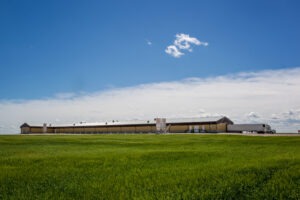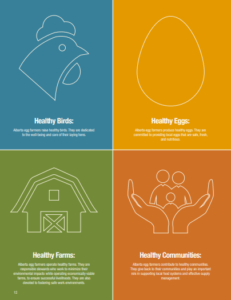Sustainable Egg Farming – A Balancing Act
Egg Farmers of Alberta, and the more than 170 egg farming families we represent, are committed to building a sustainable provincial egg industry. So much so that we have enshrined that commitment in our mission statement, which is “Cultivating a sustainable egg industry together with farmers, consumers, and other stakeholders.” However, sustainable egg production on its own is not enough for EFA. We want Albertans to understand what Alberta egg farmers are doing on their farms to enhance their sustainability, and feel confident feeding fresh, nutritious, local eggs to their families.
What exactly is sustainable egg production? What makes an egg farm sustainable?

When most people think about sustainability, the first thing that comes to mind is the environment. For egg farmers, that would likely mean building a barn with as many environmentally friendly design elements and technologies as possible, to help reduce their carbon footprint and minimize their overall environmental impact. Having said that, egg farmers have a lot more to consider than just the environment, in an effort to make their egg farm truly sustainable for future generations.
With that in mind, EFA developed a strategy in 2014 to start the provincial egg industry on the journey towards sustainability, in pursuit of our mission statement. Over the past seven years substantial progress was made, which we highlighted and tracked in annual Sustainability Reports that were published from 2015 through 2020. EFA stopped publishing these reports once all forward-looking targets had been achieved.
EFA’s desire to build a sustainable egg industry in Alberta and across Canada is even stronger today. To support this mission, EFA has refreshed the sustainability strategy that is built upon our four pillars – healthy birds, healthy eggs, healthy farms, and healthy communities – with pledges that will guide our actions and priorities for the coming 3-5 years, as we advance our sustainability journey. This new approach better aligns our provincial strategy with international sustainability reporting standards, and with the national egg industry’s sustainability strategy that was developed by Egg Farmers of Canada.
Building a sustainable egg industry is a significant, long-term goal. There are many factors that contribute to the sustainability of a single farm, let alone an entire industry. Such factors include environmental impacts (ie: energy, water, manure, waste), animal care & welfare, food safety & quality, farm worker safety, farm profitability, product diversity & responding to consumer demands, supply chain requirements, etc… There are also many different stakeholders to consider – farmers, supply chain partners, retailers & restaurants, consumers, media – who may have differing opinions about what factors the egg industry should prioritize and focus on. Egg farmers must also be aware of tradeoffs that exist between the various factors.
For example, the hen housing system that some people believe to be the best alternative for maximizing animal care & welfare, may be the worst option when it comes to minimizing the environmental footprint of a layer barn. As a farmer, how would you decide whether the laying hens or the environment is more important, when deciding what type of housing to install in your new barn? Another related example is when retail egg sourcing commitments and consumer egg purchasing decisions appear to be at odds. As a farmer, which housing system would you invest in, when you want to build a barn you can be proud of that will supply the market with eggs that will be in demand for the next 10-20 years?
Building a sustainable egg industry means different things to different people, who are equally passionate about the factor that matters most to them. EFA and Alberta egg famers must carefully consider and balance all the various factors that contribute to ‘sustainability’, while respecting the diverse opinions and perspectives of all stakeholders. Throughout the year, EFA will share additional blog posts that highlight certain factors and tradeoffs that the egg industry and individual farmers will have to work through to make egg farming more sustainable.
